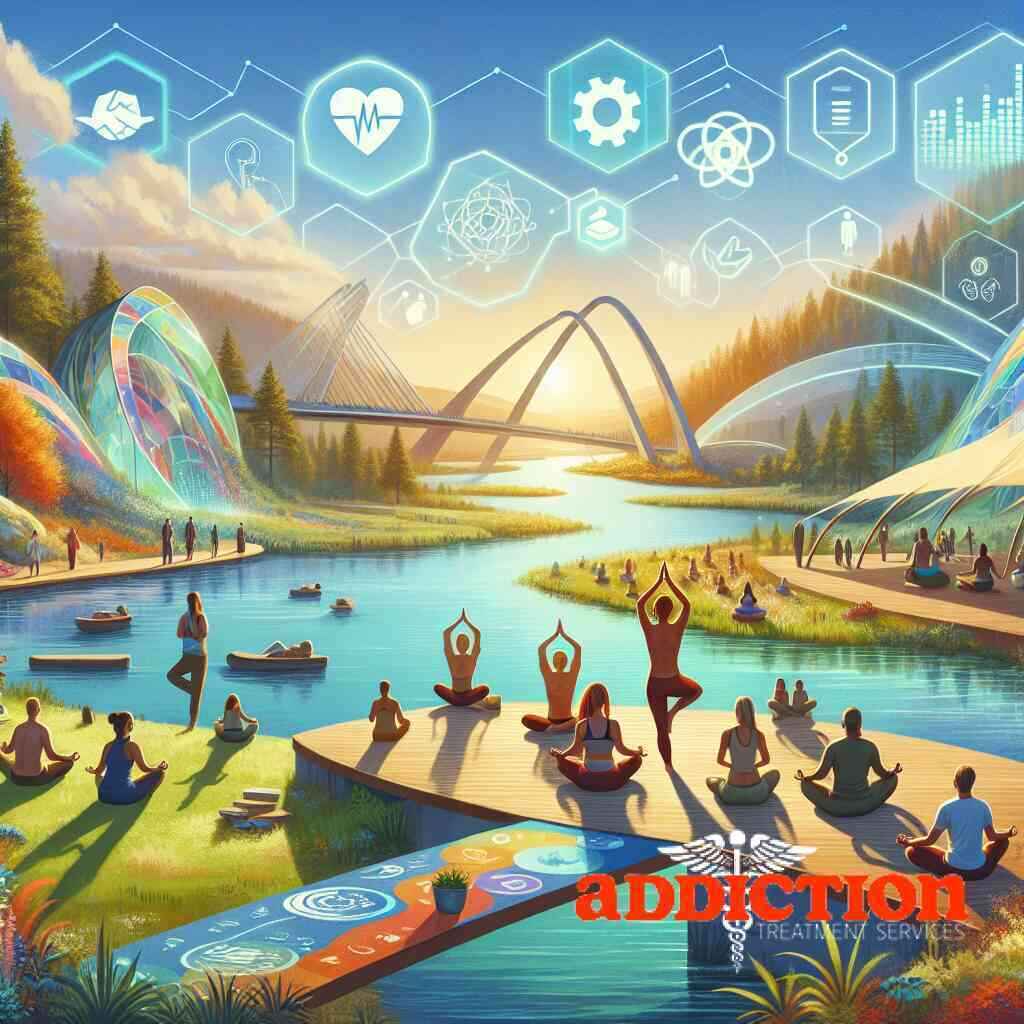 Posted On: 10/22/2025
Posted On: 10/22/2025Navigating the Intersection of Mental Health and Addiction
Demystifying Mental Health Care Integration
In the realm of addiction recovery, the integration of mental health services offers a platform for holistic healing. This multifaceted approach combines comprehensive mental health services with traditional addiction treatment, fundamentally reshaping recovery landscapes. It enhances the journey by addressing both addiction and any underlying psychological disorders, thus paving the way for sustained recovery. Mental health integration in New York, for instance, embodies this nuanced approach by consolidating services into a seamless therapeutic experience. Treatment centers such as Addiction Treatment Services (ATS) are pioneering this integrated strategy, directly influencing treatment outcomes and setting benchmarks for holistic care frameworks. This dual approach ensures that recovery addresses not just substance misuse but envelops overall mental well-being.
ATS New York: A Beacon of Comprehensive Care
Addiction Treatment Services in New York stands as a testament to the pivotal role of combined care. At its core, ATS integrates behavioral health into its addiction programs to provide a continuum of care tailored to the individual. This approach recognizes the intrinsic link between mental health and addiction and aims to dismantle the barriers to recovery. By offering personalized care plans for recovery and emphasizing patient-centered mental health care, ATS New York is redefining traditional treatment models. Such comprehensive care models not only enhance recovery outcomes but also foster long-term sobriety. Patients benefit from collaborative behavioral health in treatment, an innovative model that champions communication among mental health professionals to measurably improve both mental health and addiction recovery trajectories.
Mapping the Mental Health Ecosystem: A New York Perspective
New York’s approach to mental health and addiction recovery illustrates a vibrant ecosystem of support. This landscape is characterized by integrated care facilities at ATS that meld various therapeutic disciplines to combat both addiction and mental health disorders. Mapping this ecosystem involves recognizing its ability to cater to diverse needs, such as those requiring dual diagnosis and holistic treatment interventions. Cross-disciplinary care near New York is instrumental in breaking down treatment silos, promoting a cross-functional approach that underlines the significance of comprehensive mental health services in New York. This network of care accelerates recovery by providing targeted interventions and creating pathways that tailor rehabilitation strategies to the dynamic personal experiences of individuals in recovery. As these centers evolve, they continue to influence national standards, adapting innovative addiction and mental health synergy models that prioritize both collective and individualized healing journeys.
Unveiling Integrated Care Models at ATS
Coordinated Care: The Confluence of Mind and Recovery
Addiction Treatment Services (ATS) champions the concept of coordinated care models for recovery, a foundational aspect in the intricate process of mental health integration. In practice, this involves weaving together various treatment modalities to comprehensively address both addiction and mental health concerns. This confluence of mind and recovery is pivotal to dismantling the silos that traditionally separate mental health treatment from addiction recovery. Emphasizing a unified approach, coordinated care ensures that each patient’s mental health and addiction challenges are addressed simultaneously, fostering an environment of interconnected healing. Within ATS’s frameworks, integrated treatment strategies help redefine patient outcomes, reducing the risk of relapse and promoting sustained wellness.
The seamless integration of mental health services with addiction treatment at ATS not only improves individual recovery journeys but also sets a new benchmark in the treatment landscape. This model empowers individuals by crafting a cohesive path that reflects their unique needs, enabling a more manageable and long-term recovery process. Thus, coordinated care at ATS exemplifies an advanced paradigm where mind and recovery converge for optimal health outcomes.
The Role of Dual Diagnosis in Holistic Treatment Approaches
In its quest to revolutionize addiction recovery, ATS places substantial emphasis on dual diagnosis and holistic treatment. Dual diagnosis recognizes the coexistence of mental health disorders and substance use disorders-an intersection frequently encountered in addiction treatment settings. By comprehensively addressing both dimensions through holistic approaches, ATS enhances the quality of care provided to individuals, tackling the root causes of addiction and aiding in long-term recovery.
Holistic treatment approaches at ATS extend beyond traditional therapy, embracing methodologies that include physical health, mental wellness, and emotional balance. Such comprehensive care strategies encompass a wide range of therapies designed to nurture the mind, body, and spirit collectively. This integrated perspective not only enriches the treatment experience but also aligns with the evolving needs of individuals seeking recovery. Dual diagnosis in the ATS framework exemplifies a cornerstone in holistic treatment, harnessing the full spectrum of therapeutic interventions to support lasting change.
Behavioral Health Collaboration: A New Era in Treatment
At the forefront of collaborative behavioral health in treatment, ATS is redefining the collaborative dynamics between mental health professionals and addiction specialists. By fostering a culture of communication and cooperation, this approach symbolizes a new era in the treatment domain, setting the stage for enhanced recovery journeys.
Behavioral health collaboration involves creating interconnected networks where specialists share insights, strategies, and outcomes to optimize patient care. This teamwork fosters cross-pollination of ideas, ensuring that every individual receives comprehensive, well-rounded treatment. ATS’s dedication to collaboration underscores its commitment to advancing recovery frameworks that are patient-centered and outcome-focused.
This new era in treatment, characterized by collaboration and integration, marks a significant departure from isolated care models, promoting a greater depth of support for individuals navigating the complexities of addiction and mental health. By aligning these disciplines through a collaborative lens, ATS transforms recovery into a collective endeavor, underscoring the power of united professional efforts in achieving outstanding recovery trajectories.

Crafting Personalized Care Plans for Dual Recovery
Interdisciplinary Treatment Teams: Collaborative Care Networks
In the landscape of addiction recovery, interdisciplinary treatment teams play a pivotal role in crafting personalized care plans for recovery. By bringing together experts from various therapeutic backgrounds, these teams provide a dynamic environment that fosters collaborative care networks. This approach bridges the gap between different health care disciplines, enabling them to work together seamlessly. Interdisciplinary treatment strategies are integral to the ATS model, weaving a fabric of care that addresses the multifaceted nature of addiction and mental health disorders. These teams not only enhance the efficacy of treatment but also ensure that care is individualized to meet each patient’s specific needs.
At ATS, the emphasis on collaboration underscores the importance of integrated care, prioritizing both the physiological and psychological aspects of recovery. By focusing on the synergy between various therapeutic interventions, the treatment process becomes more comprehensive, ensuring each individual’s journey towards sobriety is supported by a robust network of professionals. This method not only improves patient outcomes but also sets a benchmark for substance use disorder treatment innovations. As a result, the journey towards recovery becomes a coordinated effort, with multiple disciplines working together to achieve a common goal.
Patient-Centered Care: Triumphs and Trials
Patient-centered mental health care is at the heart of addiction treatment at ATS. This approach places the individual at the center of their treatment journey, ensuring that their unique needs and preferences shape their path to recovery. The triumphs of this method are evident in the personalized treatment plans that empower patients, aiding them in overcoming the challenges of addiction. By prioritizing patient involvement, ATS ensures that strategies cater to individual recovery goals, making the treatment process more engaging and effective.
However, implementing a patient-centered approach is not without its trials. It requires a deep understanding of each patient’s history, personality, and health needs. Moreover, this approach demands flexibility and the ability to adapt treatment plans as the patient progresses. This adaptability is crucial for addressing diverse needs, especially in cases involving dual diagnosis and holistic treatment. ATS’s commitment to overcoming these challenges is a testament to its dedication to effective recovery.
From Relapse Prevention to Mental Health Outcomes
A critical component of personalized care at ATS is the journey from relapse prevention to achieving optimal mental health outcomes. This transition involves not only addressing the immediate dangers of relapse but also cultivating long-term mental wellbeing. The integration of evidence-based practices is key, allowing for a nuanced approach to relapse prevention that considers both addiction and mental health components.
By equipping individuals with the tools to manage cravings and stressors, ATS aims to fortify their defenses against relapse. This proactive strategy, coupled with an emphasis on comprehensive mental health care, enhances the overall quality of life for patients. Through targeted interventions and continuous care, patients are not only safeguarded from relapse but are also guided towards sustainable mental health improvements. By charting this path, ATS empowers individuals to achieve enduring recovery and improved mental health outcomes.
The Science of Integrated Treatment: Evidence-Based Practices
The Art of Therapy Integration: Techniques and Tools
Pioneering addiction treatment methodologies underscore the artful integration of therapy techniques and tools, heralding a new era in sustainable recovery. At the heart of this innovation lies evidence-based mental health practices crucial for structuring personalized and effective interventions. By seamlessly blending cognitive-behavioral strategies with holistic modalities, addiction treatment services create a comprehensive blueprint for therapy integration, one that is both robust and adaptive to individual needs. This intricate tapestry of therapeutic techniques serves as a foundational pillar that not only addresses substance use disorders but also strengthens the psychological resilience of individuals. Through this synthesis, treatment centers foster an environment where recovery is attainable through a multidimensional and personalized lens.
In harmony with these advancements, the role of technology in therapy integration cannot be underestimated. Emerging tools such as teletherapy and digital platforms for counseling expand accessibility, ensuring that support systems are inclusive and far-reaching. These digital interfaces are embedded with practical therapy resources, paving the way for continuous patient engagement and real-time recovery tracking. This transformative approach positions therapy integration at the forefront of patient-centered mental health care, shaping a new paradigm in which every facet of an individual’s journey is meticulously curated.
Cross-Disciplinary Care: Enhancing Substance Use Disorder Care
The integration of cross-disciplinary care represents a dynamic shift in enhancing care for substance use disorder. By embracing diverse clinical perspectives, treatment centers near New York amalgamate expertise from varied domains to deliver care that is not only cohesive but also exceedingly comprehensive. Cross-disciplinary care near New York exemplifies this advanced model, focusing on collaboration between distinct therapeutic specialties to optimize patient outcomes. This synergy between professionals facilitates a holistic treatment environment where physical, mental, and emotional health dimensions are collectively nurtured.
Additionally, this model fosters a collaborative care network that actively dismantles traditional silos within addiction treatment landscapes. It promotes a culture of communication and shared decision-making, which is vital for crafting responsive and proactive care strategies. Interdisciplinary treatment strategies become instrumental, ensuring that patients encounter a continuum of care that mirrors the intricacies of their recovery journey. As a result, this integrative approach not only magnifies the potential of therapeutic interventions but also catalyzes a higher standard of care, poised to meet the evolving demands of addiction recovery landscapes.
Enhancing Mental Health Service Accessibility
A paramount challenge in achieving comprehensive addiction recovery is enhancing mental health service accessibility, a challenge resolutely tackled by treatment facilities. Ensuring that mental health services are within reach underscores a commitment to inclusivity and equality, foundational elements in advancing public health outcomes. By enhancing accessibility, individuals are empowered to seek timely interventions and leverage a wider array of therapeutic resources integral to their holistic healing journeys.
Strategic initiatives focus on expanding geographically diverse treatment centers and facilitating access to underrepresented communities. Utilizing digital innovation, whether through telehealth services or mobile applications, plays a crucial role in bridging existing gaps, offering patients an unprecedented level of convenience and customization in their care. The commitment to expanding mental health care accessibility fundamentally redefines the landscape of recovery, transforming it into a universally attainable journey marked by resilience and support.
For more details on enhancing accessibility to mental health services, the mental health care accessibility initiatives continue to make significant strides towards universal inclusion.
A Glimpse into the Future: Mental Health Synergy in Recovery
Emerging Trends in Integrated Treatment Facilities
The landscape of addiction recovery is rapidly advancing, with integrated treatment facilities at the forefront of these innovations. These facilities, such as those managed by Addiction Treatment Services, exemplify how comprehensive care models are evolving to meet the complex needs of individuals battling substance use disorders. By embedding mental health services into the core of addiction treatment, these centers are setting new standards for recovery processes. Emerging trends include the use of digital platforms for remote therapy sessions, enhancing treatment accessibility and making recovery support more inclusive. As these facilities adopt cutting-edge practices, they redefine what it means to provide holistic care, thus laying a strong foundation for sustained recovery.
Integrated care facilities at ATS are paving the way for this transformation, ensuring that their strategic innovations foster environments conducive to long-term healing. By focusing on these trends, addiction treatment centers are harnessing the full potential of technology and specialized care pathways to better address the unique challenges faced by individuals in recovery.
The Promise of Mental Health Care Synergy
Mental health care synergy offers a promising horizon for addiction recovery, fostering an environment where multiple therapeutic modalities converge to enhance treatment outcomes. Combining mental health services with addiction treatment creates a multifaceted approach that addresses both substance use and co-occurring mental health disorders. This synergy is crucial for breaking the cyclic nature of addiction, as untreated mental health issues can often exacerbate substance misuse.
The integration of services facilitates better communication among mental health professionals, ensuring that everyone involved in the recovery process is aligned in their approach. This seamless flow of information improves the consistency and quality of care that patients receive, reinforcing their recovery journey. Moreover, this synergy encourages a comprehensive understanding of each individual’s needs, enabling more effective and customized therapeutic interventions. Such advancements not only promise to improve individual recovery trajectories but also contribute significantly to the broader discourse on mental health and addiction recovery.
Charting New Territories: The Future of Coordinated Care
As the mental health landscape continues to evolve, the future of coordinated care looks increasingly promising. Integrated treatment facilities are charting new territories by aligning innovative therapies with traditional models, creating a hybrid approach that maximizes the effectiveness of recovery programs. This forward-thinking strategy is instrumental in providing patient-centered care that responds to real-time needs and emerging health trends.
The future of integrated treatment facilities is characterized by the dismantling of traditional silos, encouraging collaboration among diverse specialties to foster a more unified care system. These coordinated efforts not only enhance service delivery but also promise a more empathic and effective approach to treatment. This holistic perspective is foundational in crafting a recovery framework that is resilient and adaptive to the dynamic nature of addiction and mental health challenges.
By embracing these new modalities, treatment centers are not merely reacting to current needs; they are proactively shaping the future of recovery support services, emphasizing the importance of holistic, integrated care for sustained wellbeing.

Embarking on a Journey of Mind-Body Healing
Crossing Thresholds: The Continuum of Care with ATS
The journey of recovery often begins with the significant step of seeking help through addiction treatment services. At the core of ATS’s transformative approach is a continuum of care, which seamlessly integrates various phases of treatment to provide a fluid, holistic recovery experience. This approach ensures that individuals receive consistent and comprehensive support from initial intervention to long-term recovery support. Addiction treatment services near you facilitate this journey by offering varied programs, including residential treatment and intensive outpatient programs, which cater to individual needs at different recovery stages.
This continuous care not only addresses the chemical aspects of addiction but also considers the mental and emotional facets through comprehensive mental health and addiction integration. By following a cohesive treatment path, patients experience a supportive network that fosters a deeper connection with recovery goals and encourages sustained sobriety. The ethos of a treatment facility such as ATS is to offer personalized care plans for recovery, enabling patients to cross thresholds with confidence and clarity, paving the way for successful outcomes.
Expanding Horizons: Mental Health Recovery Strategies
Incorporating innovative mental health recovery strategies is vital for creating an environment conducive to long-lasting healing. At ATS, the focus is on identifying and implementing cutting-edge practices that aid in overcoming the intricate challenges associated with co-occurring disorders management. These strategies pivot around integrating robust evidence-based mental health practices, which empower individuals by aligning treatment with their specific needs, thus ensuring resilience against potential setbacks.
By widening the horizon of available treatment options, ATS enables patients to engage with psychotherapy and recovery, encouraging them to uncover deeper insights into their behavioral patterns and emotional challenges. This introspective therapeutic process, facilitated by mental health professionals, plays a critical role in developing sophisticated coping mechanisms. It further allows individuals to address underlying mental health issues, such as anxiety and depression, which may hinder their overall recovery efforts.
Celebrating Milestones: The Reach of Recovery Support Services
A crucial aspect of the recovery process is recognizing and celebrating milestones along the journey. These achievements, no matter how small, signify progress and bolster motivation towards achieving long-term sobriety. Recovery support services offered by ATS extend beyond standard treatment programs, encompassing community engagement through AA Meetings and NA Meetings, where individuals can share experiences and support each other.
These community-oriented services provide a platform for individuals to reflect on their progress, gain new perspectives, and feel part of a supportive network. It is through these connections that individuals find encouragement and inspiration, essential for maintaining their recovery journey. The impact of sober house benefits further exemplifies the power of communal living environments in reinforcing the principles of mutual support and accountability.
By focusing on these elements, ATS not only facilitates recovery but also champions a culture of celebration and shared success, affirming the value of every step taken toward healing and wholeness. The future of substance use disorder care is brightened by these innovative approaches, highlighting the vital role of recovery support services in sustaining and enhancing the overall treatment experience.
Frequently Asked Questions
Question: What is the role of coordinated care in enhancing mental health integration at ATS New York?
Answer: Coordinated care plays a pivotal role in improving mental health integration at ATS New York by combining various treatment modalities to address both addiction and mental health simultaneously. This sophisticated approach ensures that there is a continuous and seamless therapeutic path tailored to the individual’s unique needs. At ATS, the integration of behavioral health with traditional addiction treatment fosters a cohesive healing environment, making recovery not just about overcoming substance misuse but also about achieving comprehensive mental well-being. The emphasis on coordinated care helps reduce relapses and assists individuals in sustaining long-term recovery outcomes.
Question: How do integrated care models at ATS New York benefit those dealing with dual diagnosis?
Answer: Integrated care models at ATS New York significantly benefit individuals dealing with dual diagnosis by addressing both mental health disorders and substance use problems simultaneously. This dual approach ensures that individuals receive holistic treatment that considers all facets of their health challenges. The comprehensive care strategies include personalized care plans, interaction among mental health professionals, and cross-disciplinary collaboration, creating an environment that supports lasting recovery and reduces the risk of falling back into harmful patterns. By merging mental health and addiction treatment, ATS sets a new standard in dual diagnosis integration, helping individuals manage their conditions more effectively.
Question: Can you explain how ATS promotes mental health care synergy within its recovery programs?
Answer: ATS promotes mental health care synergy by seamlessly combining mental health services and addiction treatment to create a robust recovery program. This integration allows for a multifaceted approach where professionals from various disciplines work together to provide a comprehensive treatment experience. Such synergy ensures that co-occurring disorders are managed effectively, and patients benefit from a consistent and supportive framework. This alignment within treatment strategies reinforces the recovery journey, ensuring that the individual’s health needs are holistically addressed and enhancing overall treatment outcomes.
Question: In what ways does the blog title Understanding Mental Health Care Integration at ATS in New York reflect the center’s mission?
Answer: The blog title “Understanding Mental Health Care Integration at ATS in New York” embodies the center’s mission by showcasing its commitment to pioneering comprehensive and integrated treatment methodologies. This reflects ATS’s dedication to understanding and addressing both mental health and addiction issues through coordinated care frameworks, personalized care plans, and evidence-based practices. It emphasizes ATS’s role as a leader in integrating mental health with addiction recovery, offering holistic treatment approaches that aid individuals in achieving sustained recovery and improved mental health outcomes.
Question: How does behavioral health collaboration impact patient outcomes at ATS New York?
Answer: Behavioral health collaboration is integral to improving patient outcomes at ATS New York. By fostering communication and teamwork among mental health professionals and addiction specialists, ATS ensures a holistic and continuous care experience for patients. This collaboration allows for shared insights and optimized treatment strategies, providing a well-rounded therapeutic environment. The result is a significant enhancement in recovery trajectories, supporting mental health and addiction challenges simultaneously. This concerted effort ensures that holistic treatment practices are applied, promoting better mental health outcomes and reducing the likelihood of relapse.


